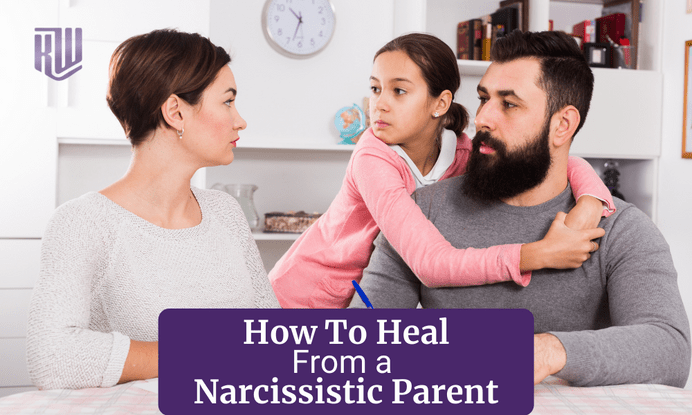The experience of being raised by a narcissistic parent is just devastating and the consequences and effects last a lifetime. It is devastating to be left with feelings of emptiness – or filled with confusion and sadness, or the sense that we’re unlovable by those who are supposed to be our greatest protectors.
This article will offer suggestions that will help you heal from this dynamic and provide you with some tips to get started on the recovery process.
1. Educate yourself (what you’re doing right now)
You’re already making a great start. Educating yourself is important and here’s why: studies show that the biggest boost of self-esteem we get comes from learning.
The core wound for those raised by a narcissistic parent is low self-worth and low self-esteem. Our identity and worth come from our parents and if they’re incapable of giving that — of creating that healthy attachment and bonding that every human being needs — it leaves us with a gaping, empty hole we then have to fix. Learning is a great way to start filling that hole.
Whenever we learn something new, there’s this massive chemical reaction inside of us — we love ourselves more for learning well. Therefore, make learning a priority. Learn about the negatives like how bad narcissistic parents are, but also learn about the positives like recovery and the journey into yourself. Don’t stop there, learn about new hobbies like ballroom dancing or painting or any other hobby; the point is to learn. Make sure you also take advantage of my free downloads here: https://kennyweiss.net/resources/
2. Seek trauma recovery
We can’t get out of this on our own. In life, if we want to achieve anything, we have to take classes with a teacher to guide us. We need someone who has the skills and tools that our parents never had to guide us along that journey. Find somebody and make that investment in yourself.
Sadly, many people will define that as a cost and have many reasons or excuses to avoid this step, but what they’re avoiding is their worth and their recovery. They’re avoiding the ability to love themselves and the ability to love their own children or spouse or anyone else. Unless we pursue trauma recovery, we are severely limiting our life capabilities. I personally don’t see any o us as a “post.” I believe we are all worth the investment.
3. Do grief work
There are five stages of grief, right? Shock/denial, anger, bargaining, sadness/depression, and acceptance. Most people live their life in the first three stages. They don’t let in the weight of what they have experienced. That then expresses itself in anger, which manifests in poor relationships, being shut down, addictions, and similar things. Then with bargaining, they look for any excuse or reason not to do the work because they’re trying to avoid step number four, the sadness. Society tends to manipulate people into a false sense of nirvana when there’s really a lot more pain and dysfunction than we ever talk about or deal with. This is how we minimize the effect of what we experienced in childhood.
This is why grief work is so important — it recognizes in all of us the part of ourselves we’ve neglected, our pain. Our denial of that pain is robbing all of us of true health. Instead, society keeps projecting the need for perfection when what we need to be dealing with is our imperfection. The day we learn how to heal our pain and imperfections is the day we start achieving acceptance and freedom.
4. Stop the self-abuse
Because of developmental trauma, we are all stuck in a cycle where we project perfection and hide imperfection. We need to rip off the band-aid and confront the denial of these imperfections. We do this by becoming an expert in our imperfections. When we can accept the deepest, darkest, most broken pieces of ourselves how could we not love ourselves? Do you see that when we can accept the most horrible thing that we never want anyone to know, it is proof of our self-love because we no longer care if others know? You can read more about this concept in my book, Your Journey to Success.
5. You need to reparent yourself
A narcissistic parent is immature; they never matured out of the narcissistic stage we all go through in early childhood development. So we need to learn how to parent ourselves. How do we do that? We need an expert. That’s part of why we have to hire somebody to help us with the trauma recovery. They also need to teach us what developmental deficiencies are. We need to use experts to help us become aware of them and essentially need to find a surrogate parent. That can be done through the use of support groups, coaches, counselors, and therapists. They become the trusted advisor we never had until we can become it for ourselves.
So if you have been raised by a narcissistic parent, it’s incumbent on you now that you’re the adult to go heal yourself. I offer plenty of free content for those looking to heal on my free online magazine site, www.thegreatnessuniversity.com. It’s perfect for those who are in the discovery phase of the process and are ready to take action. There is plenty of content on self-love, codependence recovery, narcissism recovery, and more with options to watch videos, read, or a combination of the two. There are also a ton of free exercises to download.
If you feel you are ready for the full process I would suggest looking for a trusted expert in the field to guide you along the journey of recovery. If you would like to learn more about all the different ways I help people which include online masterclasses, private groups, and private sessions, you may email me directly at kw@kennyweiss.net.
Are you looking for more solutions? Pick the one that suits your needs best!
1- My Book, Your Journey To Success
2- My Complete Emotional Authenticity Method
3- My Perfectly Imperfect Private Group
4- My Private Coaching
Learn more here:




